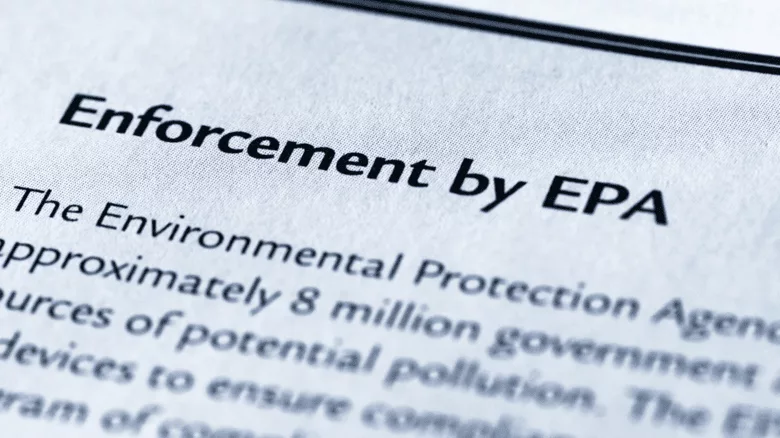Office of Water Nominee Wants States to Execute EPA Policies
‘Cooperative federalism’ is the system under which states would implement agency programs

Jon Frederick from Getty Images
The nominee to lead the Environmental Protection Agency’s (EPA) Office of Water said delegating the implementation of federal programs to the states—a concept called “cooperative federalism”—will help in the administration of EPA water policy.
Jessica Kramer, the nominee to be EPA assistant administrator of the Office of Water, provided a basic outline of cooperative federalism to the Senate Committee on Environment and Public Works (EPW), which held a hearing on her nomination on March 26, 2025. In addition to Kramer, EPW also examined the nominations of Sean Donahue to be EPA general counsel and Brian Nesvik to director of the Fish and Wildlife Service. As of press time, the EPW had not yet scheduled a date on which to vote on the nominations.
Kramer, who served in the Office of Water during the first Trump administration, said under cooperative federalism EPA programs such as the Underground Injection Control Well Program (UICWP) would be “delegated from federal implementation to the states,” and to “those who actually implement the program.”
The Safe Drinking Water Act established the UICWP to prevent contamination of underground sources of drinking water (USDW) by regulating the discharge of hazardous and non-hazardous fluids into subsurface disposal systems that can also affect surface water due to the flow into rivers and streams by groundwater. The UICWP oversees six classes of injection wells—including hazardous and non-hazardous wastes, and fluids used in petroleum and natural gas production—with each well class based on the type and depth of the injection activity, and the potential for that injection activity to endanger USDW.
EPA delegating implementation of the UICWP to the states is a policy Kramer supports because “states know their resources best,” thereby allowing “the states the ability to be more stringent in the restrictions that they put in place,” she said.
Under this “joint working together,” EPA recognizes “expertise in the states while also maintaining the oversight role that is required under the federal law,” Kramer said.
Furthermore, Kramer said policies such as cooperative federalism are needed to establish “common sense in regulation” because “a regulated community has no hope for compliance if it does not have a definitive and clear framework to work from.” Therefore it is incumbent for the EPA to produce “a thoughtful, legally and scientifically sound regulatory framework.”
EPW members asked about the level of success the Infrastructure Investment and Jobs Act (IIJA), also known as the Bipartisan Infrastructure Law (Public Law No. 117-58), is having at supporting programs to mitigate Per- and Polyfluoroalkyl Substances (PFAS) from groundwater, specifically from aquifers.
Because PFAS chemicals can build up in living things and cause various health issues, during 2024 the EPA took action on those chemicals including issuing a final rule that sets drinking water standards for five individual PFAS substances, including PFOA, PFOS, PFNA, PFHxS, and HFPO-DA, as well as issuing a second PFAS rule designating PFOA and PFOS as hazardous substances.
“Incremental progress” has occurred on PFAS, “but there is a lot of work yet to be done in this space,” said Kramer. “I say that simply because it seems that every year that goes by we learn more” about PFAS, and it has provided officials with “a better understanding of the impacts that have occurred to groundwater systems” from PFAS, as well as “the impacts” to “drinking water and wastewater systems.”
Nonetheless, “defining success with relation to PFAs is tough and a bit of a moving target,” Kramer said.
In relation to existing programs, committee members asked Kramer about the impact that executive orders issued by President Donald Trump might have on funding for water programs and projects already appropriated under the IIJA, which is to remain effective into 2026.
If money allocated under the State Revolving Fund or for programs such as replacing lead pipes is withheld from states for no reason, once it “would have come across my desk,” it would receive “prompt attention and action,” Kramer said.
Furthermore, Kramer added that if confirmed she will “look for opportunities where EPA can cut red tape that's been established across the years” and will examine “every one of the regulatory matrixes” to look “for opportunities for both innovation as well as ensuring that we (Office of Water) are still fulfilling our statutory and regulatory obligations.”
“There are some fundamental principles that have been set in statute by” Congress, and as assistant administrator of the Office of Water, Krame said she will examine those statutes to ensure “the implementation (of those statutes) is going properly,” but the office will also look for “additional flexibilities” within those statutes that will ease state and local pressures, according to Kramer.
Click here to view the hearing.
Looking for a reprint of this article?
From high-res PDFs to custom plaques, order your copy today!






